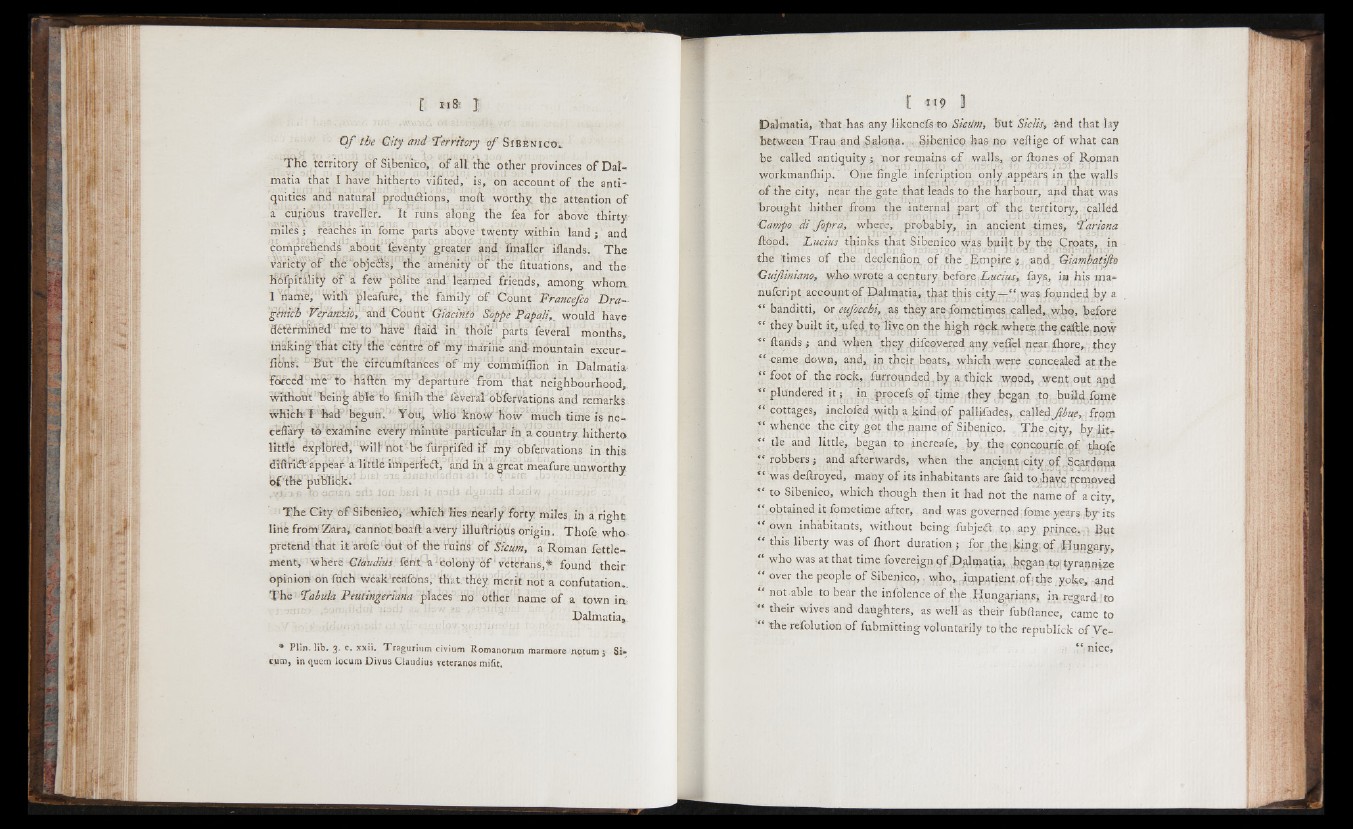
O f the City and territory o f S i b e n ic o .
The territory o f Sibenico, o f a ll the other provinces o f Dalmatia
that I have hitherto yi.fite'ti, is, on account o f the antiquities
and natural productions, moil worthy the attention o f
a curiOus' traveller. ‘ It rUns along the fea’ for above thirty,
miles; teaches 'in' fonie parts' above twenty within land; and
comprehends about fcvènty greater and mjaller iilands. The
variety o f the “objeâs^ the ' amenityL or the iituations, and the
hofpitalitÿ o f a féw ’yòlite and: lèàrnèd'friends,, among whom.
1 ‘name, With* pleafure, thè family o f Count France/co Dra-
;gm'ch VeranzioLmà CoxmtGiàchìfo Sòppe Papali, would have
BëfèiM àëd' mè"to 'hâvê ’ ftàid îii itiôie1' parts féveral months,
mâhin^thât city thé ’cëfltré :ô f my'ihMhè and mountain excur-
fic/ns. But the circumilances o f m y 1 commlfllon in Dalmatia
Fòécéd me to haftèn my departure" from that neighbourhood,
without 'hein^ âbîë’ to fiitiih thé ’ lèverai obfervations and remarks
which I had begun. Yèn, who know how much time is ne-
ccfliiry to'examine evety minute' particular hi a country hitherto
littlè éxptófèd, w ill 'not be fufprifed i f my obfervations in this
diftriaappear- a little imperfeCt,'and in a greatriieafure.unworthy
bf'the buoHfk.' -
The City o f Sibentco. which lies nearly forty miles in à. right
line from Zara, cannot boaft. a very illuftrioUs origin. Thofe who
pretend that it arol'e out o f the ruins o f Sicum, a Roman feulement,
where GISudius fënf a ;colonÿ o f ‘ vétérans,* found their
opinion on füch weakreafons, 'that, they merit not a confutation..
The Fabula Peutingeriana places no óther name o f a town in,
Dalmatia,
* Plln.lib . 3. c. xxii. Tragurium civium Romanorum marmore notum; Si»
c.um, in qucm locum Divus Claudius veteranos miilt.
Dalmatia, ‘that has any likencfs to Siotim, but Siclls* and that lay
between T-rau and ^¡alona.. . Sibenico has no veilige o f what can
be called antiquity ; nor remains o f walk*, or Hones of Roman
workmaniliip. One flngle infcription only .appears in the walls
o f the city, near the gate ,that leads tp the harbour, and that was
brought hither from tlje internal part o f thp territory, called
■Campo di fopr a., where, probably, in ancient times, Uarjona
flood-; Lucius thinks that Sibenico was built by. the Cipats, in
the rimes o f the. deplenfion o f the „Empire , and Giampatijta
Guifiniano, who wrote a; century, before Lucius, fays, in his ma-
nufcript account o f Dalmatia, that this city—“ was founded by a
“ banditti, or eufocchi, as they are fometimes .called, .who, before
“ they built it, ufed_ tq live on tlqe high rpck where, .the caftle now
“ Hands ; and when they difcovered any veffel near thore, they
“ came down, and, in their boats, whi ch were canceled at the
“ foot o f the rock,; furrqundild .by a chick wood, went out and
“ plundered i t ; in prpcefs o f time the y,began to. build fpme
“ cottages, incloled with a kind-of pallifades, called f in e , from
“ whence the city got the name o f Sibenico. The city, by lit-
“ tie and little,, began tp -increafe, by the c.oncpurfe^qf thqfe
“ robbers ; and afterwards, when the anei.ept
“ was deflroyed, many o f its inhabitants are ¿aid to.ihaye removed
P to Sibenico, which though then it had not the name o f a city,
“ obtained it fometime after, and was governed fotne years by its
“ own inhabitants, without being fubjeci to any prince. 1 But
“ this liberty was o f ihort duration ; for theilting, o f .Hungary,
“ who was at that time fovereign pf ,Dalmaiia, began ,to: tyrannize
“ over the people o f Sibenico,. wbo, ; impatient o f the yoke, and
“ not able to bear the infolence of the I Inngarians, in regard to
“ their wives and daughters, as well as their fubflance, came to
“ the refolution o f fubmitting voluntarily to the republick o f Ve-
¡1 “ nice,